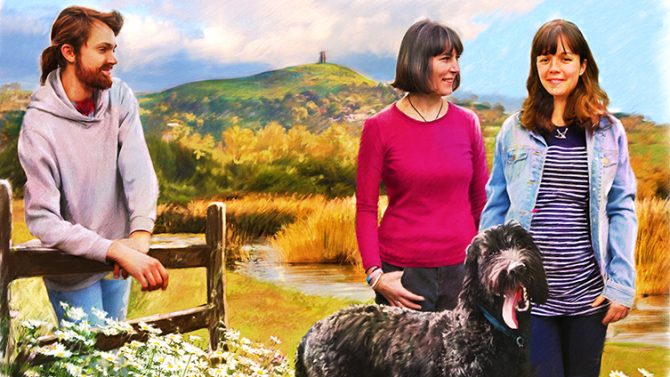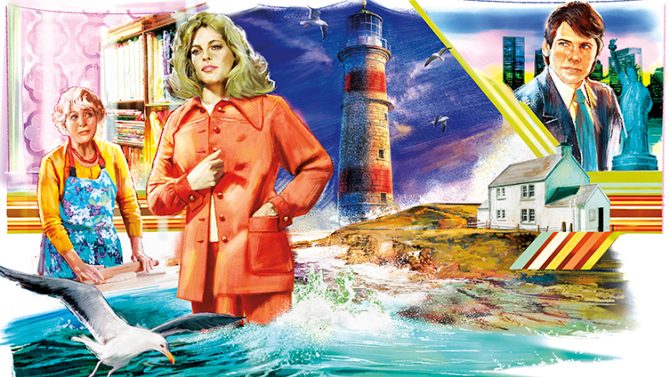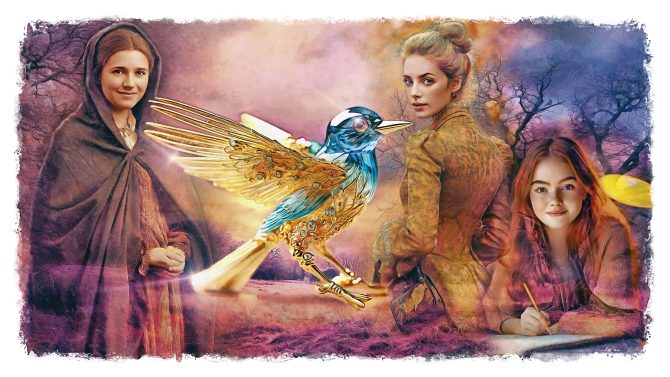Always A Hero
In this modern short story, Pamela and her sisters, Yvette and Judith, will remember the man who changed their lives in a spectacular way.

Illustration credit: Martin Baines.
Subscribe to The People’s Friend! Click here
In this modern short story, Pamela and her sisters, Yvette and Judith, will remember the man who changed their lives in a spectacular way.

Illustration credit: Martin Baines.
MODERN LIFE SHORT STORY BY LEONORA FRANCIS
Pamela and her sisters would remember this special man forever . . .
Since Pamela didn’t drive, it was quite a trudge up the hill to her parents’ house with heavy shopping bags in her hands.
She was now on the wrong side of sixty and wondered how long she was going to be able to tackle it.
Her parents lived near the top of a very steep hill in a two up, two down.
She had been born in that house and so had her sister, Yvette.
Their other sister, Judith, had been born in a hospital because the midwife had said it was now the norm.
Her parents were getting older now.
Mum used to send Dad to get the shopping, as she could no longer manage the steep hill, but he often came back with the wrong things: peas instead of beans, or courgettes instead of aubergines.
So Pamela dealt with the weekly shop, while Yvette made sure they went for their appointments and Judith watched their finances like a hawk.
For Pamela, it was also worth staying all day so she could help with tasks that her mum found difficult.
If there was nothing particularly urgent to do, she’d take out her knitting and sit drinking copious amounts of tea all day.
Pamela let herself in, all puffed out from the walk.
“Mum! Dad! It’s Pamela,” she called so as not to frighten them.
Her mum came out of the living-room and kissed her on the cheek, while Dad took the shopping from her almost numb fingers and brought it to the kitchen.
She was then ordered to sit down in the living-room that had hardly changed in 50 years.
Although Pamela was their daughter and had lived in the house until she got married, they still treated her like a guest.
And if anyone wanted to know what Caribbean living-rooms looked like
50 years ago, then they could do no worse than to visit her mum and dad.
There was still the picture of Jesus on one wall and he and his disciples on the other.
The carpet was flowered and not quite psychedelic.
In pride of place on the coffee table was a glass, multi-coloured fish with its tail sticking up in the air and a pineapple ice bucket.
A radiogram, possibly antique now, sat against the wall.
Thankfully the plastic had been removed from the sofa and armchairs, but the antimacassars, which had to be washed by hand, were still a feature.
“Tea?” Mum offered.
She brought in a tray of tea and digestive biscuits Pamela had bought the week before.
The tray had a donkey design on it that Mum had bought in Skegness on a coach trip, where half the Caribbean families in town had descended on the beach and had a party.
Pamela remembered that day clearly because it was the first time she and her sisters had ever gone on a merry-go-round.
“Have you been out this week?” Pamela asked.
Though they were almost housebound, they still visited friends and friends still visited them.
They took taxis everywhere, Judith had noted, since Mum could no longer get up the hill.
“Oh, yes,” Dad confirmed. “We went to Delvin Thomas’s funeral.”
“The name sounds familiar,” Pamela said.
“You should all remember him,” Dad stated. “He passed away in his sleep two weeks ago.”
“I hope I go like that,” Mum said.
“Me, too,” Dad agreed.
“Together,” Mum said, looking at Dad warmly.
“There wasn’t much of a crowd,” Dad continued, “but his son put on a really good do.
“He’ll be proud of him. Very proud indeed.”
Pamela changed the subject quickly because the subject of dying could go on and on – especially instructions about the arrangements, the party, the music and the food.
The older Caribbean community had an obsession with making sure every detail was perfectly in place, just so that everyone could have a good time at their funeral, even though they weren’t going to be there.
“You must remember Delvin,” Dad said. “You and your sisters used to tease him.
“Mr Pork Pie Hat – remember now?”
Dad’s long-term memory was excellent.
Pamela hadn’t thought about Delvin Thomas in many a year.
She sat upright and placed her cup on the table.
“You should have told us,” Pamela said, annoyed. “We would have come.”
When she returned home, she would call her sisters.
She knew they would be sad, too.
On the long journey home on the bus, Pamela reminisced about the first time she had seen Delvin Thomas.
She could only have been around ten years old.
That meant that Yvette was eight and Judith was going on six.
They were playing outside in the street as most children did those days.
They had charge of Judith’s old pram with the squeaky wheels, and they had stuffed most of their dolls into it.
They left their doll, Amy, under the bed in their room because they were all a little afraid of her.
She had blue eyes and blonde hair, but her eyes would open and close depending on whether she was sitting up or lying down, and she made a squeaky noise that was just too terrifying.
Pamela, being the eldest, played Mum and her sisters took orders in any make-believe games.
“Can I push the pram now?” Judith asked.
“No,” Pamela said. “The last time you let go of the pram and it rolled down the hill and we had to chase it.”
“That’s right,” Yvette said. “And I nearly got run over.”
Judith didn’t argue because what they said was true.
Pamela pushed the pram down the street with her sisters in tow.
They walked around the corner and then up towards the park.
Then they walked to the Polish shop and stopped to look at the cheesecake that Mum would sometimes buy as a treat.
As they walked, they would pass other people.
“Hello, Mrs Smith,” they’d say. “Good morning, Mr Andrews.”
When other children were about, they’d put the brakes on the pram and play with them.
Their favourite game was seven stones, but they weren’t allowed to play that any more because too many windows got broken.
They’d play hula hoops instead, or clapping games or hopscotch.
Knock down ginger was only for the brave because they were always getting caught.
One day a new adult arrived in the area.
He was tall and very thin.
The thing that was different was that his suit was dirty and his shoes needed a good polish.
Yet he wore a pork pie hat on his thick hair, which made him look comical.
Dad had a pork pie hat, but when he wore it with a suit he looked very smart.
They weren’t allowed to touch it if they played dress-up because it was hand-made, Dad said.
The man also marched instead of walking, which was quite peculiar.
“He walks like a soldier,” Yvette observed.
He soon became an oddity amongst all the children.
Pamela, Yvette and Judith did what children were inclined to do and followed him, shouting, “Left, right, left, right!” as he marched.
Pamela, being the ringleader as one of the oldest children on the street, began to call him Mr Pork Pie Hat.
“Hello, Mr Pork Pie Hat,” they chanted. “Where are you going, Mr Pork Pie Hat?”
They’d march behind him or sometimes in front of him, and they had to run a little in case he stepped on them.
He didn’t acknowledge them at all.
He just marched along, his arms swinging at his sides, with his shoulders back and his head held high.
They almost knew that what they were doing was wrong, but they couldn’t put their fingers on why it would be.
They were only marching. It wasn’t as if they were throwing stones or doing anything that bad.
They would march with him until they got bored, or if he marched past the limit of their play area they’d go and play at something else.
One day Mum caught them marching with Mr Pork Pie Hat and calling out his name.
She’d gone to town to pick up some shopping and had been coming up the hill behind them.
It wasn’t just them that day – there were other kids, too.
“What on earth do you think you’re doing?” Mum bellowed. “Leave that man alone.”
The other kids scarpered, but of course Pamela, Yvette and Judith couldn’t.
Mum looked at them in horror. They had never seen her so angry.
Pamela began to shake with fear, Yvette started crying and Judith put her thumb in her mouth.
“Get home now,” Mum said. “And go to your rooms.
“I’m ashamed of you. I don’t want to see you for the rest of the day.”
They walked the rest of the hill with her and disappeared in their room as quickly as they could.
The last time Mum had been so angry was when they had made a fire in the garden shed and nearly set it alight.
Dad had to come and rescue them.
From their room they could hear their mum downstairs, angrily banging cupboards as she put the shopping away.
She was talking to herself, but they couldn’t exactly hear what she was saying.
“It’s your fault,” Yvette said. “You were the first to call him Mr Pork Pie Hat.”
“No, I wasn’t,” Pamela defended herself.
“Yes, you were,” Judith said.
Judith stuck her thumb in her mouth and stared at Pamela defiantly.
The girls sat silently on the bed worrying about their fate.
It was also very quiet downstairs, as though Mum had disappeared.
Then they heard the kettle whistling and knew she was still around.
In truth, they didn’t know exactly what they’d done.
But deep down they knew their behaviour was not good at all.
“Mummy’s going to tell Daddy,” Yvette said, “and Daddy’s going to tell all of us off.”
Pamela agreed that that was the likeliest outcome.
They knew when Dad had returned home because they heard the front door slam.
“One day you’re going to slam that door right off its hinges,” Mum often said.
Pamela put her ear to the bedroom door, hoping to catch some of their conversation.
Soon they heard the sound of Dad’s footsteps coming up the stairs.
He threw open the door and looked at them hard.
“I’m ashamed of you, girls,” he said.
They did not look at him but at the floor instead.
“That poor man was a soldier and fought in the war,” he continued. “He arrived in England long before me and your mum.
“He got sick from the war and was in hospital for a very long time.
“The only way that man gets any peace in his head is from marching miles and miles every day, and there you are teasing him and laughing at him and making a nuisance of yourselves.
“He might not have been a war hero, but he is our own hero.”
Judith started to cry, though Pamela was sure she didn’t understand the fullness of what Dad was saying.
It was more about the tone of his voice.
Yvette put her hands up to her cheeks and cried.
“But we were only marching with him,” Pamela declared, on the verge of tears.
“And calling him names,” Dad replied.
That put Pamela in her place.
“Don’t let me ever see you teasing him again, you hear?”
“Yes, Daddy,” they said in unison.
“And I want you to all write him a letter of apology,” he said. “Now, get downstairs before your dinner gets cold.
“I’ll speak to Delvin tonight, if I can find him.”
Mr Pork Pie Hat still marched about the area, but the girls – and it seemed all the other children – got the message and left him alone.
When he marched by, they stepped out of his way or crossed the road to give him room.
Months later, Mr Pork Pie Hat would change the lives of Pamela, Yvette and Judith in a spectacular way.
That day, they were pushing their pram around the block. Their dolls were tucked in nicely.
Inside the pram, they had placed a skipping rope and some chalk, in case they wanted to play hopscotch or skipping games.
They passed the launderette and the butcher’s and ended up at Moira Flynn’s house.
Moira was Pamela’s friend at school and she told Pamela that her dad had got her a puppy.
“Me da got a puppy for me birthday,” Moira had said. “Da said she’s a golden retriever.
“Ma said that she’s going to grow into a monster and how are we ever going to feed it, but Da said it’ll eat all the leftovers.”
Pamela parked the pram under the window-sill.
“Hello, Mrs Flynn,” she greeted Moira’s mum. “Can Moira play out, please?”
Mrs Flynn had red hair and wore red lipstick.
The girls had agreed that she was a beautiful woman and looked like a film star.
“Yes,” she said. “How’s your ma and da?”
“They’re fine, thanks, Mrs Flynn.”
Mrs Flynn turned to call Moira to the door, but Moira was already standing behind her, all excited and smiling, while holding a puppy that was almost as big as she was.
“Now mind, girls,” Mrs Flynn said. “Make sure Sandy doesn’t run off. Don’t let her run out into the road.”
“Come on, Sandy,” Pamela said to the puppy, patting her knees.
Sandy almost knocked her down as she stood up on her back legs and reached up with her paws.
Judith was allowed to push the pram a little since they were walking on the flat and Pamela and Yvette were preoccupied.
Judith lagged behind because she decided she didn’t like the dog.
Sandy barked and pulled on its lead in her direction.
Judith jumped and wanted to run.
“She won’t hurt you,” Moira said.
Sandy, being a big strong puppy, wasn’t to be deterred and pulled away from Moira and ran towards Judith.
Judith turned and ran on to the road and straight into Mr Pork Pie Hat.
He grabbed Judith in one hand and the dog in the other and hauled them from the road just as a car screeched to a halt.
Judith was crying, while Mr Pork Pie’s hat was squashed under the car’s wheels.
It happened so fast, the girls didn’t have time to scream, but stood in stunned silence.
The driver of the car hooted his horn and shook his fist before driving off.
“Are you all right?” Mr Pork Pie Hat asked Judith.
“Yes, Mr Pork Pie Hat,” she said.
He smiled and then went to retrieve his hat, brushed it off carefully and placed it on his head.
“Take care that you hold on to that puppy,” he warned them. “Never let go of a dog’s lead, no matter what.
“Goodbye, young ladies.”
They watched him go, marching as if nothing had happened.
Left, right, left, right.
To the girls he was their hero.
He was their saviour.
“Well,” Judith said. “He lived a long life.”
The sun was shining, but it was cold and crisp.
There were very few people at the cemetery that morning.
Pamela leaned forward and read the words on the cross, which was to be replaced by a headstone.
Delvin Adolphus Thomas, husband, father and grandfather.
Born on 10/2/1919, passed on 2/11/2023.
“Wow. He did live long,” Yvette said.
“It was all that marching,” Judith replied. “I heard he was marching into his nineties.
“I wouldn’t be here if it wasn’t for him.”
Pamela shed a little tear as Yvette sniffed into a hanky.
“He was so brave,” Pamela said tearfully.
“I suppose we had better do what we came here to do.” Yvette sniffed.
Judith had a little plaque made that she carefully stuck into the ground, between all the flowers.
In remembrance of Delvin Thomas – Mr Pork Pie Hat – our hero.
From Pamela, Yvette and Judith.
“Let’s go to the pub and reminisce about him and the old days,” Pamela suggested.
Their dad had said that Delvin Thomas wasn’t a war hero.
But in the pub that day, the girls all agreed that Mr Pork Pie Hat would always be their hero.
Enjoy exclusive short stories every week inside the pages of “The People’s Friend”. On sale every Wednesday.

Paula Williams

Deborah Siepmann


Alison Carter


Teresa Ashby

Beth Watson

Alyson Hilbourne

Katie Ashmore

Kate Hogan

Liz Filleul

Beth Watson